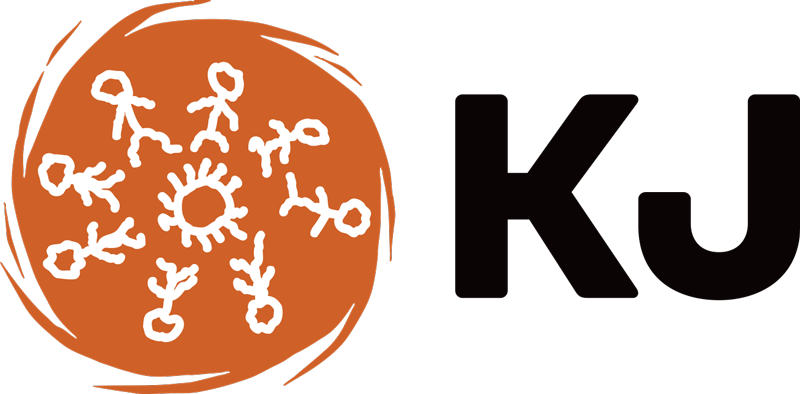Kartimarni patu, kartimarni wimi, kartimarni warrarn (Holding Warnman people, language and Country together)
Juneja-ya, kumujungku Warnman patu-ya wimijungku-ya. Pulkulpayi-ya warrarnja wantimanyiku.
In June, a group of Warnman people gathered to share their language. They were so happy to be on Warnman Country again.
Forty-four Warnman patu (people) came together at the southern end of Warnman Country for the KJ Warnman Language Camp. People came from three nearby communities, Punmu, Parnngurr, and Jigalong, as well as from Port Hedland, Broome, and Perth. This long-awaited trip marked a significant moment as it brought many Warnman people back to their Country, for some, for the very first time.
The trip sparked an important and ongoing conversation about keeping wimi (Warnman language) strong. Many of the remaining fluent speakers gathered to talk about language to share with their younger generation. These talks were recorded and used to create ‘Warnman Basics’ the first resource of the wimi program. This simple language guide helps families living far from their Country use wimi every day.
For the younger generations, the trip was a great chance to visit their Country, learn stories, and follow cultural protocols for burning and caring for their Country. The experience made everyone excited and eager for more camps in the future to keep wimi strong! We thank the Indigenous Language Arts Program for their support of this program.
“Ngalypangulyu Warnmanmili warrarnja-la wantimanyi. Wuyurr parrajarramili ngalypa wantimanyi, ngalypa patu-ya kulpamanyi-ya warrarnja-la yana-ya. Jurlurrpa julyamaja purli lirrka Pulkartuyuru. Warnman patu-ya kulypanyi-ya mirta-ya parrayaninya-ya warrarnja. Walyja-ya palawarninyjarra paturniya wantinya warrarnja. Miraljinya minyanpa, partawarta julurr pinyilkarra walyjajaja-ya parrayana yalawana. Patu-ya kulypayarra-ya warranjaja langamaranyja julurr purli lirrka Pulkartuyuru, Pulkartu kukujuna-ya marninya. Partuniya purtu ngurrirna Pulkartuku kulypanya-ya jurna walyjangka langangka. Ngalypa patu yungku warinykanya langa walyja, patu-ya warnti-ya pararra Adelaideja ngurrpa-ya janamili langa Warnman ninti-ya wantiku wulu. Wimi kumpinyu wantinya lirrkaparti. Katimarni parrawarta Manyjilyjarra japumarta wantinya langa wimi lirrkaparti walyja. Parrajarramili murtilya nintijinya parrangkumili warrarn ka wimi ka walyja miraljinya. Pinyina parrajarramili murtilya kartiyarna warrarn walyja. Ngarru wantinya langaku wulu. Wimi kunyungujinya punyja wantinya ka partiku jiji yungunjaja puntarjuila yungku.
All the Warnman people, having them come back. Many haven’t been to their Country, though their families have. Some might have vivid memories, while others just know stories from their family who’ve been there. People have left their Country, there are no more people left there. It’s a little bit like that story of Pulkartu (white quartz), where Pulkartu was taken, and we’ve been looking for that Pulkartu to bring it back home.
It’s good to have the younger generation back there because there’s a lot of Warnman people, some as far as Adelaide, who know that they’re Warnman, but they don’t their Country and they need to know it. That wimi (language) it’s separate, on it’s own. How I see it, Manyjilyjarra is the dominant language in the Western Desert, and people don’t know their own language, but that wimi (Warnman language) holds that land.
To have my children learn about their wimi and their Country, where they come from, gives them a sense of knowing where their place is. It was really important for me to take my child back there. He’s really curious about our Country and wanting to know more. That wimi (language) and that Country has been sleeping for a long time and it’s waking up now with the children.”
📸 Group photo: (Back) Jacquelin, Rachel, Glendall, Karston, Kleon, Amon, Cynthia, Noelene, Gabby, Cassandra, Rae-sharn, Yikarli, Elstreia, Terrence, Archie, Steven, Julie, James, Clarrie Jr., Tisharnee, Beatrice. (Front) Daryl, Keharne, Fred, Raqcuel, Desmond, Moses, Helen, Jadai, Curtis, Brenda, Maryanne, Ashuranie, Barbara, Jaqualen, Julie, Delvine and Sharon.
















